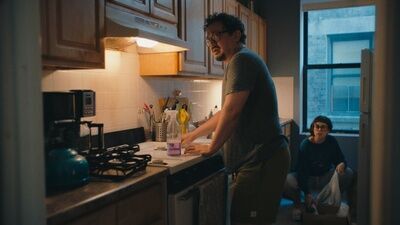Q&A with co-writer/director Mike Donahue
How did this movie come about?
As a director, I’ve always been drawn to stories of unexpected or surprising intimacy—and to stories about people who reveal themselves to be something other than what you initially assumed. With “Troy,” we were specifically inspired by our own experiences with a particularly wild and engaging neighbor. Though in our fictional version, it’s not even just the neighbor’s raucous sex—it’s also his monumental heartbreak, his celebratory joy. Troy is a man who unapologetically (and loudly) lives in extremes. I don’t think Thea & Charlie are in a bad relationship, but I do think they’ve become overly settled in their routine and overly comfortable. They’re people who, when we meet them, are living within a fairly narrow bandwidth of daily experiences. One of Troy’s gifts to them is that he wakes them up to the peaks and valleys of life—whether they’re turned on together because of his epic orgasm, deeply feeling his heartbreak, or feeding off the mystery of who he is. Troy shocks them out of their routine of eating takeout on the couch and silently watching TV; because of Troy, they actually start talking to each other again, find shared passions and curiosities, and make events out of their daily tasks together rather than just living routinely through them.
I noticed so many movies I ended up programming for this year’s Chicago Critics Film Festival were films that were (like yours) very sex-positive, even though the merits of “sex in film” are currently being debated by younger audiences. Did you and your co-writers have discussions about the attitude toward sex and the character of Troy and what you wanted to convey and/or avoid?
Yes! We knew from the jump that we wanted to make something sex-positive* and open-hearted. Both thematically and tonally. Thea and Charlie are continuously surprised by each new IV drip of information they get about Troy—but at every turn, when they could be judgmental, they instead lean in. I think Thea, as a character, is extraordinarily empathetic—for me, the moment she hugs their shared wall, attempting to send her neighbor a hug through the wall, is what the film is really about. At a talk back in my conservative hometown, one well-meaning person said: “I think this movie is so important right now because it teaches us that gay people are people too.” And while that isn’t … quite what I think the takeaway is—I do love that she was zeroing in on that. Ultimately, this little film is humbly hoping to inspire us all to have more curiosity and compassion for one another. Sex-positivity and a non-judgemental approach to Troy and his sex work are key to that.
*Maybe worth noting, the actor who plays Troy is an internationally known gay porn star under the name Hans Berlin.
I love that Dylan Baker shows up briefly, turning in a memorable performance with so little screen time. Can you talk about that scene and how he got involved?
Dylan Baker is the most extraordinary and transformative actor—he elevates every single film and TV series he’s in. For the past decade, I’ve worked primarily as a theater director. Dylan was one of the first directors I ever assisted back when I got out of grad school and had moved back to NYC from Berlin. Dylan has remained incredibly supportive of me, and I’m so grateful he was game to come in and shoot with us for a few hours.
